LinkedIn is arguably the world’s cringiest platform, at least for me. From the over-exaggerated “dear network I’m proud to announce…” post for a very generic life event to the recruiters that think they are unique simply because they are self-aware, I hate LinkedIn with every fiber of my being.
But despite all the fakeness and faux professionalism, it still remains a great platform to search for job opportunities, internships, clients, and thought leaders. However, innocent as it may be, I’ve recently discovered an exploitative trend that is only growing on Moroccan LinkedIn and no one seems to call it out.
I’m talking about false promises, bots, and account selling. So I investigated the source, benefits, and details of these scams and unraveled how you are being lied to and exploited for someone else’s benefit. Here are my findings:
Where it All Started

Like every other ambitious worker, I was made aware of LinkedIn years ago. While I mostly ignored it, I’ve gotten back to using this platform months ago since it provides great opportunities for freelancers like me.
This was when I started to browse my feed and notice what the platform holds. From a sea of “boomer Whatsapp” posts and pretentious exaggerated achievements, opportunity listings and network invitation threads stood out positively.
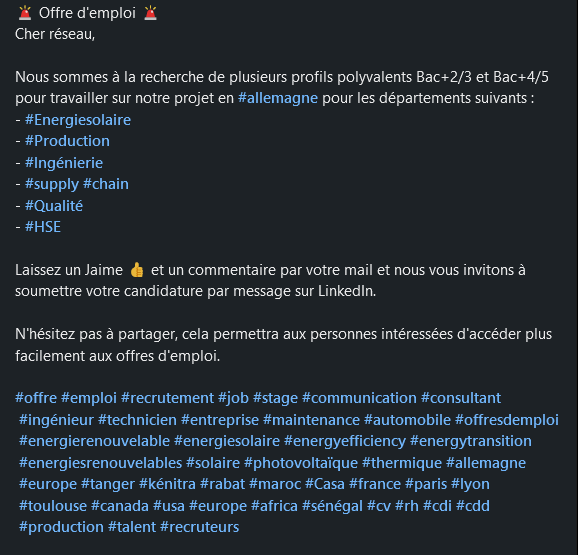
Posts like these were overbearingly popular on Moroccan LinkedIn, with every person I know interacting with these types of posts at least once. Even I liked and commented with my email on an opportunity post just to “not miss out.”
However, when doing so, I felt surprisingly uneasy. “Surely, they can’t process every single applicant for simply liking the post”, I thought to myself. Even if they had the latest software script, they must be skipping thousands of applicants who interacted with their posts.
That’s when it hit me, they probably do not. Hundreds if not thousands of these accounts are utilizing the same illusions to trick millions of users and benefit from them.
The Most Common LinkedIn Exploits
Cutting straight to the chase, LinkedIn has seen a wave of fake posts that scam, exploit, and use desperate job-seeking individuals for whatever their gain is. Although this was a past issue for international LinkedIn, it seems like Moroccan LinkedIn is just discovering these dubious posts.
From influencers wanting more followers to scammers building their next email database, LinkedIn exploitations come in many forms including:
Fake Job and Internship Offers
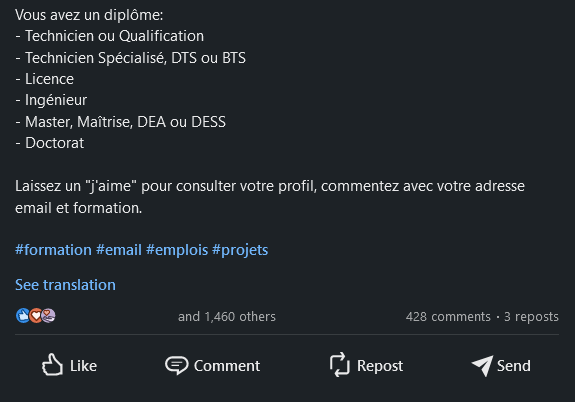
By far the most annoying and prevalent exploitation scam, fake job and internship ads have been running rampant without any consequence for the pasts months.
Typically, someone will pretend to be a recruiter or offer a position, claiming that they are looking for profiles to hire for a specific region. (go figure this region is usually a popular dream destination for the said audience, Like France, Canada, and Germany for Moroccans).
To be considered for these vague opportunities, applicants need to like the post and comment so that the recruiter will view their profile and ‘magically’ match them with an opportunity fit for their skills.
Other villainous versions also include listing your email (to add you to spam newsletters), uploading your CV (to harvest your data), or registering to some website (to copy your password).
Despite the risks, it is easy to understand why these types of posts are so successful. By simply taking 1-3 seconds to like and then 10 seconds to comment, people get an instant faux-productivity boost and a chance to secure a potential job position.
Networking Bait
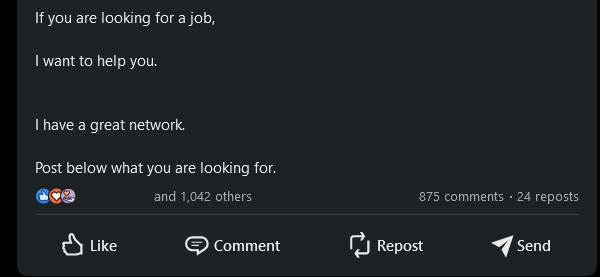
Everyone knows that building an impressive network is the key to success in careers. In freelance, business, and art it’s about who you know rather than what you know (no shame about this). So it is only natural that people strive to network with others and establish meaningful connections, and LinkedIn might just be the best platform to do so easily.
This is where scam posts like the ones mentioned above introduce themselves as a hub for people to network with each other. But in reality, those posts only benefit their creator as it increases their following list which in turn boosts their relevancy. In reality, these posts will most likely NOT lead to fruitful connections with others. No one will take the time to browse thousands of comments just to stumble upon yours.
Alas, the best way to grow a network on LinkedIn is to just connect with other users, interact with their posts, and possibly start conversations. It’s that simple.
Begging Posts

Disclaimer: Posts of this type can be genuine. If so is true, then my critique does not apply to them. This is for fake begging posts.
These posts usually come with a picture taken on the street concrete of an empty orange file holder, shoes that have been taken off, a water bottle, and the post owner sitting on the ground. Followed by a caption that says that they have been trying all day and they have a sick mother with grueling debt, begging for users to like, comment, and share their post so that they can help.
All so they can farm that sweet follow, like, and comment reactions from people.
Don’t get me wrong, some of these posts can be a real ask for help. Yet most of the ones I see on LinkedIn are painstakingly begging for likes and followers. They tug on your humane strings and guilt trip us into aiding them by just sharing or liking their posts. While you may be a kind person, they are not.
In most cases, they are either looking for a way to gain followers or are stealing somebody else’s position who is more qualified for the job. As a matter of a fact, some posters are already employed yet they keep pleading for followers and reactions.
Reframing The Popular Opinion as Unpopular (Circlejerk)
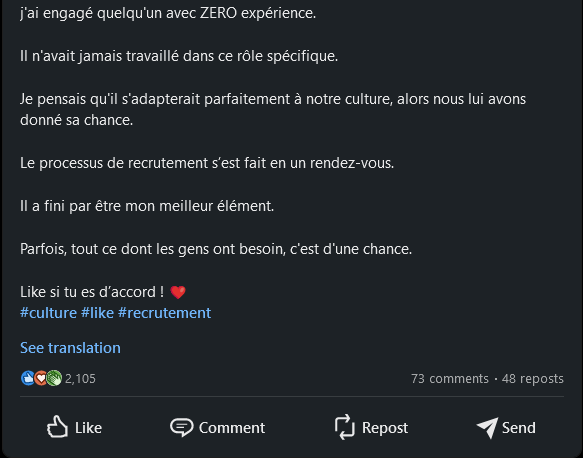
If you are familiar with Reddit or any sort of platform that farms interactions, then this concept is very familiar to you. Essentially, the post owner tries to farm attention by stating popular (and often obvious) opinions as something of a unique daring take.
While it can be something as simple as saying that cereal goes before milk (it doesn’t), LinkedIn post farms have their own way of doing so. They are two concepts which are: “hiring interns is good” and “giving a chance to people without degrees”.
LinkedIn users go ballistic over these types of posts with the post owners sharing made-up stories or advice about how life-changing hiring an intern can be. Or thinking that they are unique by hiring employees based on their skills over their diplomas.
In retrospect, these concepts are painstakingly simple and popular. Yet these posts see thousands of interactions from fellow users that are (you guessed it), interns and people without degrees searching for a job or opportunity, creating a circle jerk of posts.
The Newest Tinder

The final most annoying part about Moroccan Linkedin is how it is becoming the newest Tinder. While I admit that turning LinkedIn into a dating platform isn’t exploitation in itself, I feel that I just have to talk about this.
Every day, hundreds of males will slide into a girl’s DM in an attempt to date her, and justify it by claiming it is for networking or for hiring purposes. Not only is this utterly miserable behavior, but it is also uncomfortable for the recipient who has to reject them. In some cases, these people will try to get a girl’s number from her CV (resume) as well as her social media information, giving them the power to stalk them indefinitely.
This goes without saying: LinkedIn is not Tinder.
What Do They Benefit?
It doesn’t take more than 5 seconds to come across any of these posts on LinkedIn (I think this could be a speedrun category), which goes to prove the monumental success of these types of content. It’s safe to say that we do not know better, but from this point onward we will see what post owners gain from these posts and how they are exploiting you.
Wannabe Influencer
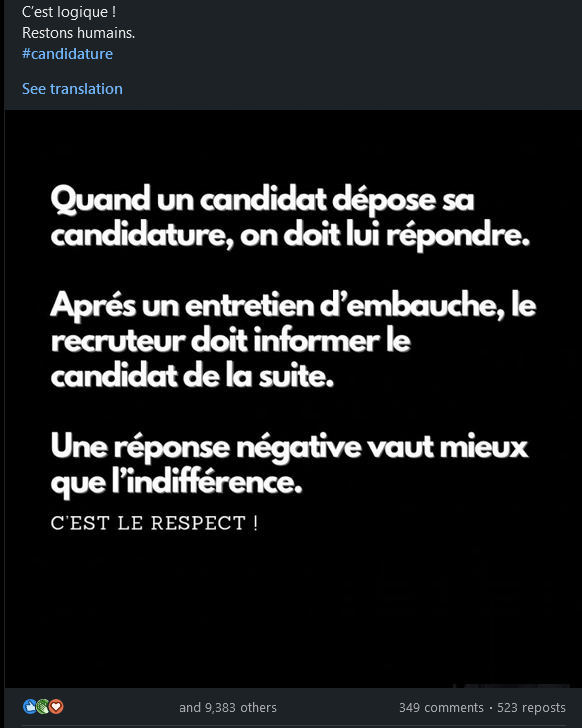
Clout is a dangerous drug to get addicted to. From seeing your notification tab get bigger to reading comments about how great your content is, social media platforms do a great job at hooking us in generating fame and followers.
LinkedIn is no stranger to chasing clout and fame. If anything, the nature of LinkedIn itself encourages people to become figures in their space. Since LinkedIn is presumably a “professional business platform”, influencers and figures believe that if they were to gain followers> people will know their name> and they will receive job offers.
At the same time, entrepreneurs and self-made business people equally believe that if they were to have more followers then their client net will be wider, thus selling more courses or services that they provide.
I am unsure if becoming a LinkedIn influencer really does land opportunities like the ones mentioned above, but from the minimal research I have done, that isn’t the case. Unless the figure is sharing original content rather than curating/faking their posts (which is a lot), businesses and individuals aren’t interested.
Sell Accounts
Arguably not a malicious aspect since no one is being harmed, account selling on LinkedIn is prevalent and lucrative. Companies and figures who are looking for a way to skip the difficult growth part will gladly pay for a popular account with thousands of followers. Once the purchase is made, the original account is rebranded to the buyer’s liking, and the login details are modified as well.
I certainly cannot deny that a hustle is a hustle, no matter the kind. If someone is making money out of this method then good for them. However, if it comes into the wrong hands (i.e scammers trying to appear more legitimate through big accounts) or is grown through lies and deceit (i.e this whole blog topic), then it can be a hassle to deal with.
Lead You to Scams
In a series of fake job, internship, and course posts, scammers will advertise to a group of candidates and benefit in various ways. From gathering desperate innocent folks to spamming you with “exclusive” deals, they will stop at no measure to reel you in.
Once they do, then you might as well hand out your entire wallet, accounts, and identity to them. Some cases include sending candidates websites in which they need to make an account to continue with their job application process. These websites are coded to harvest your email and password login, counting on the fact that your other accounts share the same login details.
Similarly, other scams will also involve the applicant making financial payments in the name of the company. For example, a job applicant might be asked to make a payment in their name on behalf of the company, which will refund them refund later on. Needless to say, the company does not exist and the money is gone forever.
Finally, scammers might also direct clueless job applicants to their course, which will often be a requirement to get hired. Talking from personal experience, I once applied to a copywriting position found on LinkedIn. Hours later, I received a message that claimed that I need to have a certain certification to be considered for the job. This was followed by a link to the course itself from a separate account, detailing an “exclusive” discount on the same certificate for only $40.
Writing has always been free and will always be free. You do not need someone to sell you a certificate for a skill.
Collect Your Data
Much like scamming people out of their money, fake job posts are also searching for your identity to steal it. Often pretending to be a company hiring online, scammers will ask applicants for their CIN, Bank information, physical address, and phone number so that they can clear some paperwork to start working. However, what happens is that these villains will steal someone’s identity, impersonate them legally, or sell their data online to spammers and hackers.
While it is fine to share information about your phone number and email on your CV which anyone (pretending to be an employer) can see, you should probably skip out on listing your physical address. Similarly, never sign a contract or reveal sensitive information unless you’ve verified it in real life and legally sorted it out.
How to Avoid Fake Announcements
To make this blog post no longer than it should be (Already 2000 words deep), I will leave you with the following advice.
Do your research and double-check the minor details.
By simply taking mere minutes to run a background check on someone, use logical thinking, and verify all information then you will become invulnerable to this exploration. If it’s too good to be true, it probably isn’t.
